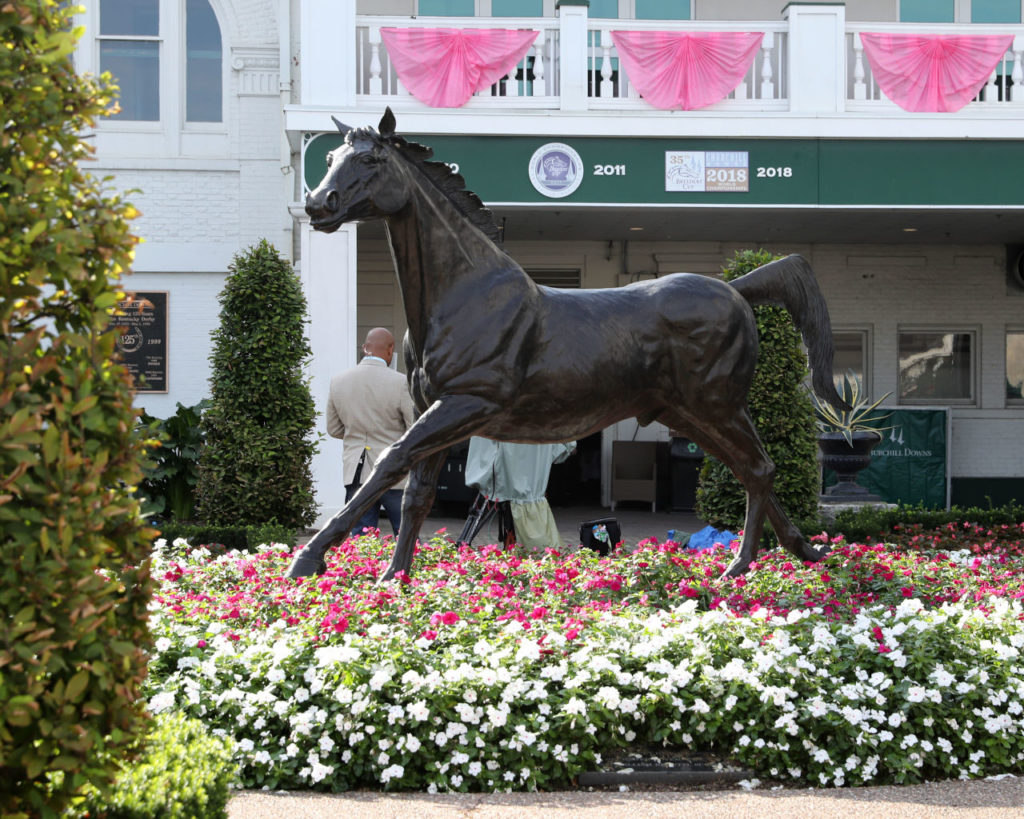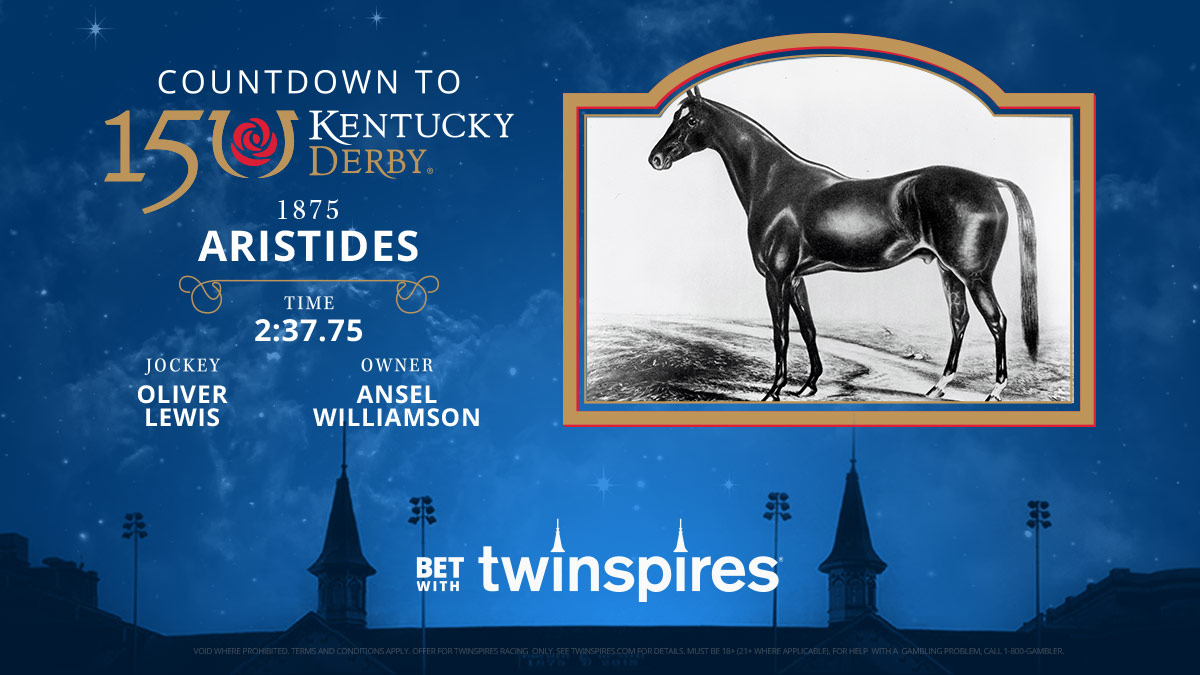Aristides, Part 3: Life and legacy after the inaugural Kentucky Derby
Apr 28, 2024 Kellie Reilly/Brisnet.com

Aristides in bronze at Churchill Downs (Photo by Coady Media)
Continued from Aristides, Part 1 and Part 2
Aristides turned in another blistering performance next time out in the one-mile Withers S. at Jerome Park. The Spirit of the Times marveled at his 'terrific pace at the finish…like the recoil of a powerful spring.'
Nevertheless, despite the colt's triumphs, McGrath was to render another crushing disservice to the honest Aristides, in the furtherance of a gambling scheme typical of the rough-and-tumble practices of the 19th century. Earlier in the year, he had placed a hefty wager on Calvin in the Belmont S. at Jerome Park, and if he won, McGrath stood to reap a $30,000 windfall. Therefore, Calvin must win the Belmont. Aristides was also entered, and Lewis was given his tactical instructions. Unlike Chesapeake in the Derby, Calvin came sweeping on cue in the Belmont, and Lewis had to put Aristides under a fierce hold to let the preferred stablemate win.
The Athenian Aristides had also subordinated himself to another, but he did so willingly, and for an infinitely better reason. Although it was his turn to command, in the order of rotation, he willingly yielded to the masterful general Miltiades. Aristides the Just gave up the honors for himself, in order to serve the cause of Greece. McGrath, in contrast, had compelled his Aristides to make way for a decidedly inferior animal, in a bit of skullduggery that would have shocked the conscience of the Athenian.
The legendary turf authority Walter S. Vosburgh was unequivocal about the matter in his Racing in America, 1866-1921:
'He could, and should, have won the Belmont also, but Lewis nearly pulled his head off to allow (jockey) Bob Swim to win with Calvin, and the crowd shouted: 'Let go that horse's head!''
Aristides was defeated in his next two outings, placing second in the Ocean Hotel S. at Long Branch and third in the Travers S. at Saratoga, but he rebounded with a victory over Calvin in the two-mile Jerome S. The little red colt was then unplaced as part of the heavily favored entry with Chesapeake in the Dixie S. at Baltimore.
Might this have been another McGrath subterfuge? For the winner of the Dixie was to carry five pounds extra in the Breckinridge S. three days later. Throw the Dixie, to get a favorable weight and higher odds in the Breckinridge? Whether that was part of the strategy or not, it certainly turned out that way: Aristides went off at a generous price in the Breckinridge, the fifth choice in a five-horse field. With first-call rider Swim aboard, Aristides surged to a two-length victory, and cemented his place in the record book as the top three-year-old of 1875.
He would surely have ranked as a premier older horse as well, but he raced only three more times. At four, Aristides won both of his races in tremendous style, leading Vosburgh to declare that 'at the time he seemed to be the best horse in training.'
On May 10, 1876, at Lexington, he met Ten Broeck in a 2 1/8-mile sweepstakes. No one else dared to oppose them, and the affair became a match race. McGrath, at long last, was bullish about his colt, and he backed him as if defeat were out of the question. He took bets from countless Woodford County racing aficionados who believed in Ten Broeck, but he did not keep any records of their bets. McGrath's friends noted that, if Ten Broeck won, legions of people would come to him claiming that they had placed a wager with him – how was he to know?
'The little red hoss'll keep the books today,' McGrath confidently asserted.
The Athenian Aristides was likewise entrusted with delicate financial responsibilities. Because of his thorough-going honesty, he was deputized to watch over the booty captured from the enemy at the battle of Marathon. Later, Aristides the Just was appointed to assess the contributions from Athens' allies in the Delian League, judging how much each could afford to pay. Only he could be perfectly impartial, and incorruptible.
The equine Aristides did, in fact, keep the books as well. He crushed Ten Broeck by five lengths in a new American record time of 3:45 1/2.
'The victor was cheered to the echo,' Turf, Field, and Farm reported. 'McGrath won thousands of dollars, and the speculative crowd from Woodford went home 'dead broke.''
That was a particularly eye-popping performance from Aristides, for Ten Broeck never lost again that season, going on a tear and thrashing all comers. Ten Broeck literally ran out of competition over the course of his career and ultimately took to racing against the clock. He set records at a wide range of distances from one to four miles, earning himself a place in the National Museum of Racing Hall of Fame. But he was no Aristides, in the eagle-eyed view of Vosburgh:
Ten Broeck 'was the beau-ideal of a race-horse in appearance, but probably was overrated, for when fit and well Aristides always beat him.'
Another beauty from above by @CoadyPhoto, gazing at the @ChurchillDowns sculptures of Aristides & #PatDAy #KyDerby pic.twitter.com/YLt3iE9UEy
— John Asher (@johnasher) May 10, 2016
Just three days after his triumph over Ten Broeck, Aristides established yet another American record by capturing a 2 1/2-mile purse in 4:27 1/2. He spotted the loose-on-the-lead Bazar either 14 or 18 pounds, depending on the source, and was all heart to collar him in the stretch.
Aristides was sidelined by injury for two years thereafter. He was not seen again under silks until May 13, 1878, at Lexington, when he came full circle in his final start. Just as in the Phoenix Hotel S. in 1875, he caught a heavy track, failed to find any traction, and was unplaced to his old foe Ten Broeck.
It was an anticlimactic end to Aristides' distinguished career. The six-year-old retired with a record of 21-9-5-1 and $18,325 in earnings. After McGrath's death in 1881, he was sold several times, and had considerable appeal as a stallion prospect. But Aristides was a disappointment at stud, and he wound up living out his days near St. Louis, where he died on June 21, 1893. This, too, comports with the evidence regarding Aristides the Just: after he had served Athens, he returned to the quiet, unassuming life of a private citizen, and he died as a man of modest means, if not outright poverty.
But history has been kind to both of them. The Athenian became a byword for moral rectitude down through the ages, and the little red horse is forever remembered as the first Kentucky Derby winner.

On Aug. 2, 2024, Aristides will join Ten Broeck in the Hall of Fame, the culmination of other honors he received in recent years. A glorious bronze statue of the colt was cast by Carl William Regutti, capturing Aristides in full flight, and enshrined in the Churchill Downs paddock in 1987. Since 1989, a sprint stakes has been run in his honor at Churchill, a tribute to the high speed that he displayed on that very same track.
Sadly, history took longer to give Ansel Williamson his due. In view of the pervasive racism of the day, his accomplishments, and even his complete name, were forgotten in the years after his death in 1881. When lists of Kentucky Derby winners were compiled, Aristides' trainer was mistakenly identified as 'A. (or Andy) Anderson.' His rightful identity belatedly restored, Ansel Williamson was duly recognized as the conditioner of the first Kentucky Derby winner, and inducted into the Hall of Fame in 1998.
Although Williamson had trained other luminaries, he will be inextricably linked to Aristides – the 'best kind' of horse, who won the Kentucky Derby, the 'best kind' of race.
This feature, originally published more than a dozen or so years ago on a former incarnation of KentuckyDerby.com, was dusted off from the archives in honor of the 150th Derby, and updated to note that Aristides will be enshrined in the Hall of Fame at last.
Ticket Info
Sign up for race updates and more
THANK YOU TO OUR SPONSOR
